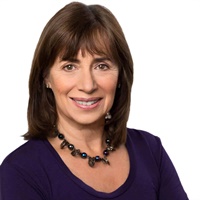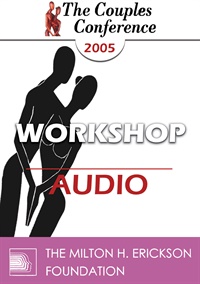CC05 Workshop 08 - High Impact Couples Therapy: A Developmental Model to Start and Sustain Effective Treatment and Confrontation with Difficult Couples - Part I - Ellyn Bader, PhD
- Average Rating:
- Not yet rated
- Topic Areas:
- Workshops | Couples Therapy | Developmental Therapy Model | Confrontation | Therapist Techniques
- Categories:
- Couples Conference | Couples Conference 2005 | Pioneers in Couples and Family Therapy
- Faculty:
- Ellyn Bader, PhD
- Duration:
- 1:45:16
- Format:
- Audio Only
- Original Program Date:
- Mar 05, 2005
- License:
- Never Expires.
Description
Description: A comprehensive workshop exploring effective couples therapy techniques. Learn to address relationship challenges through a developmental model focusing on breaking negative cycles, setting goals, and fostering individual growth. Includes practical strategies for therapist engagement, self-assessment homework, and skill-building interventions to help couples move beyond blame and reconnect.
Syllabus Description: Difficult couples challenge therapists with their aggressive interactions, their demands for intimacy and their high levels of sensitivity to any confrontation. Dr. Bader will demonstrate how to start and sustain positive momentum with these high distress couples. Participants will discover how to create a context for change that uses four pillars to anchor all sessions. Participants will learn to make strong confrontations, take a firm leadership role and more smoothly interweave intra-psychic and systemic interventions. Video, role-play and clinical transcripts will all be used to demonstrate these principles.
Educational Objectives:
- To identify the four Pillars of Relationship Change.
- To name two ways to help each partner take responsibility for change.
*Sessions may be edited for content and to preserve confidentiality*
Credits
Handouts
| Timestamped Transcript Part A (887.9 KB) | 20 Pages | Available after Purchase |
| Timestamped Transcript Part B (772.8 KB) | 16 Pages | Available after Purchase |
| Ericksonian Learning Snapshot (245.3 KB) | 2 Pages | Available after Purchase |
Faculty

Ellyn Bader, PhD Related Seminars and Products
Ellyn Bader, PhD, is a founder and director of The Couples Institute in Menlo Park, California. As a clinical psychologist, workshop leader, author, and speaker, she is dedicated to helping couples create extraordinary relationships. Over the past 30 years she has trained therapists in couples therapy throughout the United States as well as Europe, Asia, South America, and Australia. She served as a Clinical Faculty in Stanford University School of Medicine for 8 years.


